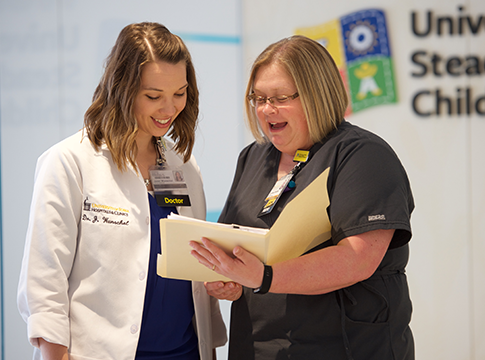 Year Two provides the opportunity for trainees to complete their required clinical experiences in adult and pediatric allergy/immunology and also assures completion of all procedural skill requirements. Fellows also complete required clinical rotations in Pediatric Rheumatology and Adult HIV, as well as an educational rotation in the Immunopathology laboratory. The fellow spends three-four ½ days per week in the outpatient clinics, including their COC clinic. The second year fellow also assumes a leadership role on the inpatient consultation team, assumes increasing responsibilities for patient care and teaching of first year fellows, residents and medical students. Time is provided for ongoing scholarly work and the fellow will continue to meet on a regular basis with both their research mentor as well as their Scholarly Oversight Committee. It is expected that the fellow will submit at least one abstract to a national meeting (either the American College of Allergy, Asthma and Immunology [ACAAI], the American Academy of Allergy, Asthma and Immunology [AAAAI], or the Clinical Immunology Society (CIS). It is hoped that the fellow will have at least one manuscript accepted for publication in a peer reviewed journal.
Year Two provides the opportunity for trainees to complete their required clinical experiences in adult and pediatric allergy/immunology and also assures completion of all procedural skill requirements. Fellows also complete required clinical rotations in Pediatric Rheumatology and Adult HIV, as well as an educational rotation in the Immunopathology laboratory. The fellow spends three-four ½ days per week in the outpatient clinics, including their COC clinic. The second year fellow also assumes a leadership role on the inpatient consultation team, assumes increasing responsibilities for patient care and teaching of first year fellows, residents and medical students. Time is provided for ongoing scholarly work and the fellow will continue to meet on a regular basis with both their research mentor as well as their Scholarly Oversight Committee. It is expected that the fellow will submit at least one abstract to a national meeting (either the American College of Allergy, Asthma and Immunology [ACAAI], the American Academy of Allergy, Asthma and Immunology [AAAAI], or the Clinical Immunology Society (CIS). It is hoped that the fellow will have at least one manuscript accepted for publication in a peer reviewed journal.
Throughout Year Two, the fellow is expected to attend and participate in Immunology Grand Rounds, journal clubs, board review sessions, research conferences, hands-on workshops and case-based conferences. The second year fellow will be asked to assist with planning of these various educational activities as well as the Division CME course. He/She will serve a leadership and teaching role in these various activities. In addition the fellow is provided the opportunity to attend one additional educational meeting during the second year (i.e. Clinical Immunology Society [CIS] Summer School, Aspen Allergy Conference, ACAAI/AAAAI Board Review Course, ATS Annual Meeting).